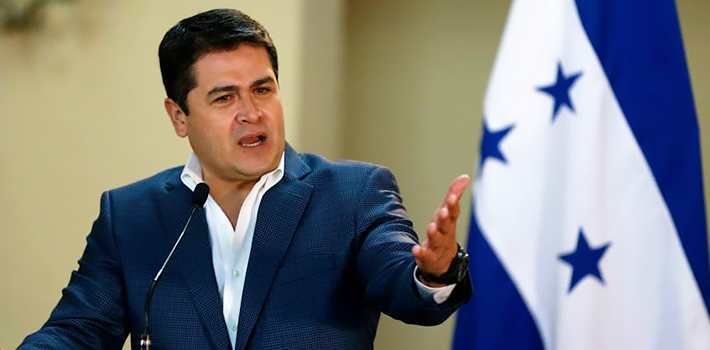EspañolIt is customary that after the first 100 days, newly installed administrations review their books, and all the achievements they have accomplished are published. Even though three months is not exactly a time frame that will determine whether the new administration will be successful or not, it does give us an idea of what to expect in the forthcoming years. It is also an opportunity for the new administration to present the policies they intend to implement throughout their term in office.
In the case of Honduras, we face significant economic challenges that include a growing fiscal deficit, high unemployment and poverty levels, and an enormous security crisis. In response to these pressing concerns, these first months under the administration of Juan Orlando Hernández have fallen short, to say the least. Public spending, for example, hasn’t been reduced, and the announced austerity policies have yet to be implemented.

Under the public eye, most would agree that the first 100 days have actually been a continuation of the past government of Porfirio Lobo. Even though Lobo was president, it was widely known that Juan Hernández (at that time president of Congress) was the one who actually ruled, and Lobo pleased his every whim. Both governments have earned reputations for being incompetent and corrupt.
The promises touted by Hernández in his campaign have remained as propaganda and “good intentions” but do not show real results. Worse, new taxes are the order of the day, and the fiscal burden is untenable for the grand majority of citizens. This not only discourages investment, it demonstrates the prevailing regime uncertainty.
The public-private-partnerships alliance has failed to bring in investments and generated criticism over its lack of transparency. Recent accusations show that each commissioner earns close to the equivalent of US$10,000 per month — more than the president’s salary. While these individuals prance around at our expense, where is the public spending reduction?
Extradition and the Militarization of Public Security
Despite the president’s self-congratulatory declarations regarding his “advances” towards improving security during his first months in office, the real actual situation is completely chaotic.
One of the most worrying developments is the militarization of the police, to the detriment of citizens’ human rights. Even though president Hernández’s number one issue was always security — given all the promises he made to eradicate it — the high rates of crime, murder, extortion, kidnapping, infanticide, drug trafficking, gang activity, robbery, and death squad massacres are now more present and visible than ever.
In his battle to fight the war on drugs, the first legal extradition of a Honduran citizen took place on May 8, when drug kingpin Carlos “El Negro” Lobo was extradited to the United States. Although heralded by many, it is very likely that the repercussions from the international drug cartels against the Honduran government and its citizens will include more violence and deaths.
The murder of children has been escalating in Honduras in the past years, but it reached a peak this month with the killing of more than 10 children in a rural area of the country. Even the United Nations issued a statement against this despicable act. Government officials maintain that these are all drug-related crimes and “messages.”
Also, last week, the director of a renowned international organization that works for homeless youth, Casa Alianza, was the victim of a heavy-handed beating at the hands of the private security of the secretary of state in the Security Department (part of the military). Witness accounts vary against Guadalupe Ruedas, but the worst his attackers allege is that he was drunk.
Even if that were the case, it was an act of brutality to beat him up in that manner. He has been leading a campaign against the government, because of all the infanticides that have been occurring. He claims that was the real reason of this vile attack against him — the intolerance that characterizes the Hernández administration.
The government aims to combat insecurity through a mesh of military-enforced agencies like the newly created Military Police (PMOP), the Inter-Institutional Security Force (FUSINA), and the Intelligence Troops of Special Response Groups (TIGRES). But in reality, all of these institutions just create more bureaucracy and show no real results.
In February, the secretary state in the Security Department announced the creation of their own “violence observatory,” even though one already exists and functions under the National Autonomous University of Honduras. It is an academic center that presents statistics to indicate the current reality, one that the government refuses to recognize.
Another security initiative that has generated rejection among Honduran society is called “guardianes de la patria” or guardians of the homeland. Under this program, the military is supposed to foster sentiments of love for their country in kids and teenagers, as well as generate values and promote a culture of peace. This clearly contravenes the human rights of children, given that these educational activities must be conducted by civil institutions, mainly schools.
Freedom of Speech, or Lack Thereof

The 2014 Freedom House annual report on freedom of expression, out this month, includes Honduras alongside nations without a free press. The latest country profile notes high levels of violence and intimidation against the media, with the backdrop of government propaganda as a thinly veiled strategy to silence independent voices.
This was exposed yesterday, when members of the opposing party protested in Congress and were attacked and repressed by the military — a demonstration of total intolerance towards dissent.
The lack of transparency and accountability is also evidenced by the passing of the Official Secrets and Classified Information Act that empowers senior government officials to disclose only what they choose.
The outlook for years to come does not leave one inclined towards optimism. Whatever positive initiatives the government has had are overshadowed by corruption, centralization of power, cronyism, intolerance, and excessive use of force. Honduras has a long way to go before becoming the Dubai of Central America.
 Versión Español
Versión Español












